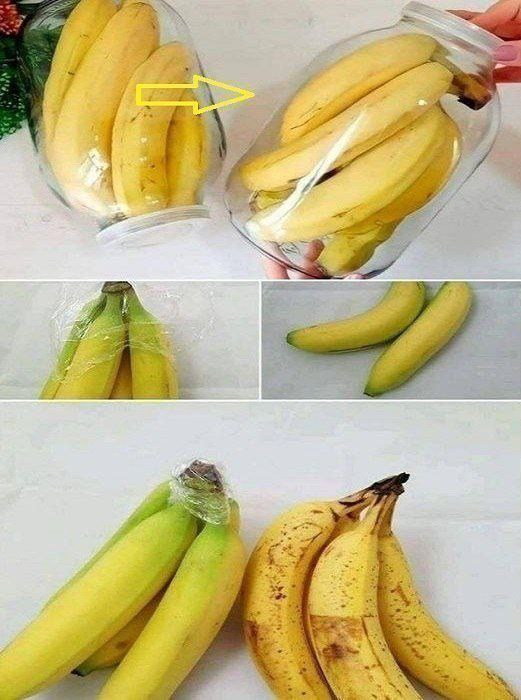We’ve all experienced it: buying a large bunch of bananas, full of good intentions to enjoy them throughout the week, only to see them turn brown or black before you’ve eaten them all. It’s a frustrating and wasteful cycle. But here’s the good news—you don’t have to throw them away! With a few simple techniques, you can preserve bananas for much longer, even up to two years, ensuring they’re ready whenever you need them. Whether you plan to bake, freeze, or ripen them quickly, these methods will help you make the most of every banana.

Choosing the Best Bananas for Baking
If you’re a fan of banana bread, muffins, or smoothies, you know that the best bananas for baking are not the perfectly yellow ones but the overripe ones with lots of brown spots. These spots indicate peak ripeness, and the bananas will have a sweet aroma that signals their natural sugars are fully developed. The riper they are, the better they are for baking, as their sweetness and soft texture enhance your recipes. In fact, bananas that are brown or even black on the outside are ideal for baking because they’re packed with flavor and are incredibly easy to mash.
Storing Ripe Bananas for Future Use
So, what do you do when your bananas reach that perfect ripeness but you’re not ready to use them? Freezing them is the answer! To freeze ripe bananas, first peel them to avoid dealing with messy peels later. Place the peeled bananas in an airtight container or a zip-top freezer bag, either whole or sliced for easier portioning. Be sure to remove as much air as possible from the bag to prevent freezer burn.
Stored properly, bananas can last up to two years in the freezer. This method is perfect for anyone who loves to bake or blend smoothies, as frozen bananas retain their sweetness and texture. When you’re ready to use them, simply take them out of the freezer, let them thaw for a few minutes, and they’re ready to go. Freezing bananas not only prevents waste but also ensures you’ll always have ripe bananas on hand for your favorite recipes.
How to Speed Up the Ripening Process
What if you have bananas that are still green and you need them to ripen quickly? There’s an easy fix for that. One popular method is to place the bananas in a paper bag and seal it tightly. Bananas naturally release ethylene gas, which accelerates the ripening process. The bag traps this gas, allowing the bananas to ripen faster. For an even quicker ripening process, add an apple or avocado to the bag, as these fruits also release ethylene gas.
If you don’t have a paper bag, placing the bananas in a warm spot, like near a sunny window or on top of the refrigerator, can also speed up ripening. The warmth encourages the bananas to ripen evenly, making them ready for baking or snacking in no time.
Why Use Ripe Bananas for Baking?
Ripe bananas are a game-changer in baking. As bananas ripen, their starches break down into natural sugars, giving them a sweeter flavor and a softer texture. This makes them easier to mash and incorporate into batters, resulting in moist, flavorful baked goods. Recipes like banana bread, muffins, and cookies benefit greatly from the sweetness and aroma of ripe bananas.
On the other hand, using underripe bananas can lead to bland flavors and a rubbery texture in your desserts. Ripe bananas not only improve taste but also reduce the need for added sugar in recipes, making them a healthier choice.
How to Tell if Bananas Are Overripe
While ripe bananas are ideal for baking, it’s important to know when they’re past their prime. If a banana is leaking liquid, has a strong fermented smell, or has become overly mushy, it may no longer be suitable for use. However, most bananas that are very brown or black on the outside are still usable as long as there’s no mold or spoilage. Always check the inside—if it’s creamy and free of discoloration, it’s good to go.
Conclusion: Maximize Your Bananas, Minimize Waste
Bananas are one of the most versatile and forgiving fruits, and with the right techniques, you can enjoy them for months—or even years. Freezing ripe bananas is a simple way to ensure they’re always available for baking or smoothies, while speeding up the ripening process can save the day when you need them ripe in a hurry.
So, the next time you see your bananas starting to turn brown, don’t toss them out. With these easy methods, you can preserve them, enjoy their natural sweetness, and reduce waste. Whether you’re baking banana bread, whipping up a smoothie, or simply snacking, these tips will help you make the most of every banana, keeping them fresh and ready for any occasion.